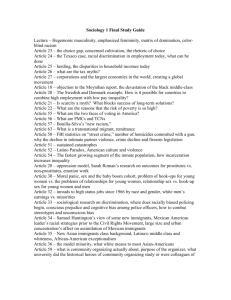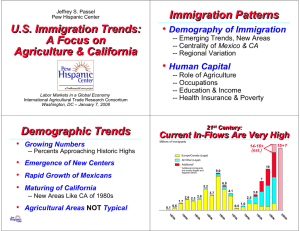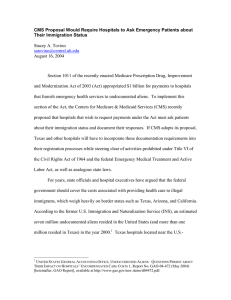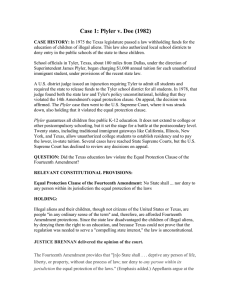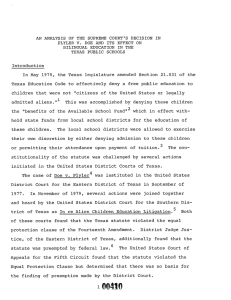Access to Healthcare for Unauthorized Workers
advertisement
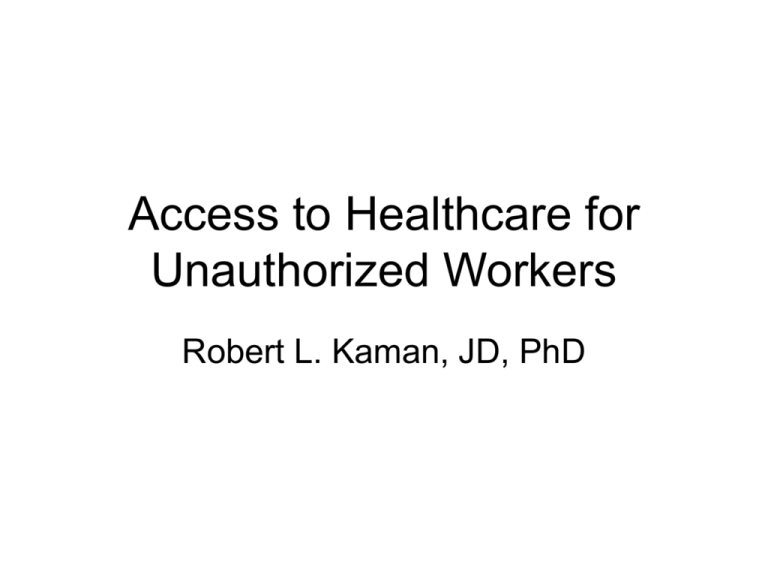
Access to Healthcare for Unauthorized Workers Robert L. Kaman, JD, PhD The Facts • Twelve million unauthorized persons currently in the US – Five hundred thousand enter each year – Typical immigrant is a young (26-29) healthy male • 58% adult male, 26% adult female, 16% children – Most common health care problems are postnatal complications and chronic disease • Diabetes, heart disease, hypertension “What is Right?” • “…nor shall any State …deny to any person within its jurisdiction the equal protection of the laws.” (US Constitution 14 th Amendment) • Everyone has the right to a standard of living adequate for the health and well-being of himself and of his family, including…medical care…” Article 25, Universal Declaration of Human Rights) ( • States Parties …guarantee the right of everyone, without distinction as to race, color, or national or ethnic origin, to equality before the law, notably in the enjoyment of the ….right to public health, medical care, social security and social services. (Article 5 (e) iv, International Convention on the Elimination of All Forms of Racial Discrimination) • Governments have a responsibility for the health of their peoples which can be fulfilled only by the provision of adequate health and social measures. (Charter of the World Health Organization) What is the Law? • Federal Government may selectively govern health care – Taxing and Spending Power; Commerce Clause – EMTALA: hospitals must provide emergency health care – Illegal Immigration Reform and Immigrant Responsibility Act of 1996: • Illegal immigrants are ineligible for Medicaid • Legal immigrants must wait five years before receiving Medicaid – “Emergency Medicaid” in Medicaid regulations: • Allows immigrants, legal or illegal, to get emergency and trauma care at hospitals, but • Single adults over 18 and childless couples under 65 are excluded • Health care is governed at the level of state law in the US (by omission): – “The powers not delegated to the United States by the Constitution, nor prohibited by it to the States, are reserved to the States respectively, or to the people.” - 10th Amendment, US Constitution State Law • California: – Proposition 187: “Publicly-funded health care facilities must deny care, except in medical emergencies, to people who can not prove US citizenship or legal residency status.” • Passed in 1994 • Not implemented due to state courts finding that parts conflicted with existing state law • Subsequently, federal court found that 187 was pre-empted by federal law. • Texas: Texas Law • Recognizes that EMTALA requires provision of emergency room care, immunizations and treatment for communicable diseases to illegal immigrants. • Must deny non-emergency care unless state legislation has been enacted to provide it. Twentythree states have passed such law. – Texas has not. – “…Texas hospitals could lose millions of dollars in federal aid if they continued offering such services.” -Former Texas Attorney General John Cornyn (2000) Second Opinion • Texas State Senator Jane Nelson (Chair of the Health and Human Services Committee) asked the current attorney General, Greg Abbott, in 2004, if physicians could legally see undocumented immigrants with impunity: – “Does Section 285.201 of the Texas Health and Safety Code require a hospital district to provide nonemergency care to undocumented persons who are otherwise ineligible for those benefits under federal law.” Reply • “…this chapter affirmatively establishes eligibility for a person who would otherwise be ineligible under 8 USC Section 1621 (a), provided that only local funds are utilized for the provision of non-emergency public health benefits. A person is not considered a resident of a governmental entity or hospital district if the person attempted to establish residence solely to obtain health care assistance.” Greg Abbott, Texas Attorney General, 2004 What is the Practice? • Unauthorized persons may seek emergency care, immunizations and treatment for infectious disease (EMTALA) – Crowded emergency rooms – Late, more costly stages of illness • Unauthorized persons use disproportionately fewer medical services and contribute less to health care costs in relation to their population share – Better relative health – Lack of health insurance – Some evidence exists that despite an overall surplus of payments over benefits, local hospitals may not receive enough payment to cover services to undocumented persons. • “How will you pay?” – Cash: “Step right in.” – Insurance: not likely – only 22% of unauthorized immigrants have health insurance (The Rand Company) – I can’t pay: “May I see your papers?” • Generally, proof of county residence Parkland Hospital, Dallas TX • “When the undocumented come to Parkland, it is more important that they live in Dallas County since we don’t ask for nationality. We get criticized, but we feel that preventive services and primary care can often prevent the need for care in later emergencies.” • “We treat undocumented people as we treat everyone, so infectious diseases are not different. However, we use this analogy (sic) to argue with those who want us to turn them away. Surprisingly, these right wingers do want us to treat their domestic worker with TB (or their waiter in a good Mexican restaurant). They also want immunity when challenged and they don’t want the ED congested with nonemergencies when they (the right wingers) have a heart attack. Usually we can win them over with such analogies. We can also show an economic advantage to providing prenatal care for example. Also, the IOM published a study in ’97 (repeated in the last couple of years) which showed that the undocumented pay SS and Medicare taxes, for which they receive no benefit.” – Parkland Hospital Administrator, 2008 John Peter Smith – Fort Worth, TX • JPS welcomes all pregnant females into its maternity program, including prenatal, natal, and post-natal care. – Has a “large” enrolment of unauthorized women – Receives Medicaid reimbursement • JPS requires documentation of “identity” of all patients, proof of county residence, and method of payment – Does not require proof of citizenship – Reputation among immigrant community is that they are not welcomed; thus, many do not seek care • JPS excludes unauthorized immigrants from its charity program that provides preventive healthcare Duty to Treat • Physicians and/or hospitals do not have a duty to treat, except in an emergency. • Does an American citizen have a right to health care? How about a non-citizen in the country? What is the cost to society? • A health care provider’s ethical responsibility? • Justification for restricting health care for illegal immigrants: – Inherent rights – Taxation – Benefits Is Health Care a Right? • Seminal case involves education, not health care: – Plyler v. Doe, 457 US 202 (1982) • May a state (Texas) deny to undocumented school-age children the free public education that it provides to children who are citizens of the US or legally admitted aliens? • “In determining the rationality of this law, we may take into account its costs to the Nation and to the innocent children who are its victims. In light of these costs, the discrimination in this law can hardly be considered rational unless it furthers some substantial goal of the State… • It is difficult to understand what the State hopes to achieve by promoting the creation and perpetuation of a subclass of illiterates within our boundaries, adding to the problems and costs of unemployment, welfare and crime. • If such a denial is made of free public education to a discrete group of innocent children it offers to other children residing within its borders, it must be justified by furthering some substantial state interest. No such showing was made. Court of Appeals decision, which held that illegal aliens were entitled to the protection of the Equal Protection Clause (14th Amendment), and the Texas law which denied education to them was unconstitutional, was affirmed. Do the courts view healthcare in the same way? • • • • • Mathews v. Diaz, 426 US 67 (1976) – Congress may condition an alien’s eligibility for participation in a federal medical insurance program on (time of residence in this country) and this classification does not deprive aliens of liberty or property without due process of law Wilmington v. Manlove, 174 A.2d 135, (Del. 1961) – “…private hospitals owe the public no duty to accept any patient for nonemergency care not desired by it, and it is not necessary to assign any reason for its refusal. Hospital does have a duty to provide emergency care. Crespin v. Coye 27 Cal. App.4th 700 (and others) – The amendments enacted by SB 485 which require all applicants to declare whether they are US citizens, nationals or aliens with satisfactory immigration status is constitutional. Perez v. Health and Social Services, 91 NM 334 (1977) – Denial of claim for state-provided health services was reversed for person who lived for over seven years in the state, intended to remain; state’s refusal based on federal immigration control was not applicable, since state law providing service was wholly state funded St. Joseph’s Hospital v. Maricopa County, 138 Ariz. 127, 673 P.2nd (App. 1983); Reconsid. Den’d, No. 17556, October 23, 1984. – Undocumented aliens may qualify as county residents under the statutes mandating that a county reimburse a private hospital for providing emergency medical care. Question • If the US prison population, regardless of citizenship, is guaranteed free access to health care, in compliance with the Eighth Amendment prohibition against cruel and unusual punishment, – Can we argue that a denial of health care to unauthorized immigrants is a violation of the Eighth Amendment, or – Should we urge unauthorized immigrants commit a crime to get imprisoned when they need health care? Summary • Undocumented persons have limited access to health care – Emergency care – Maternal care – Non-emergency care if funded by non-tax dollars • Health care is not a right – – – – Equal protection not violated No duty to treat May ask for proof of residency (citizenship?) if ask everyone Different than education • Result is undocumented persons do not seek care until it is an emergency, more costly, and less effective.







